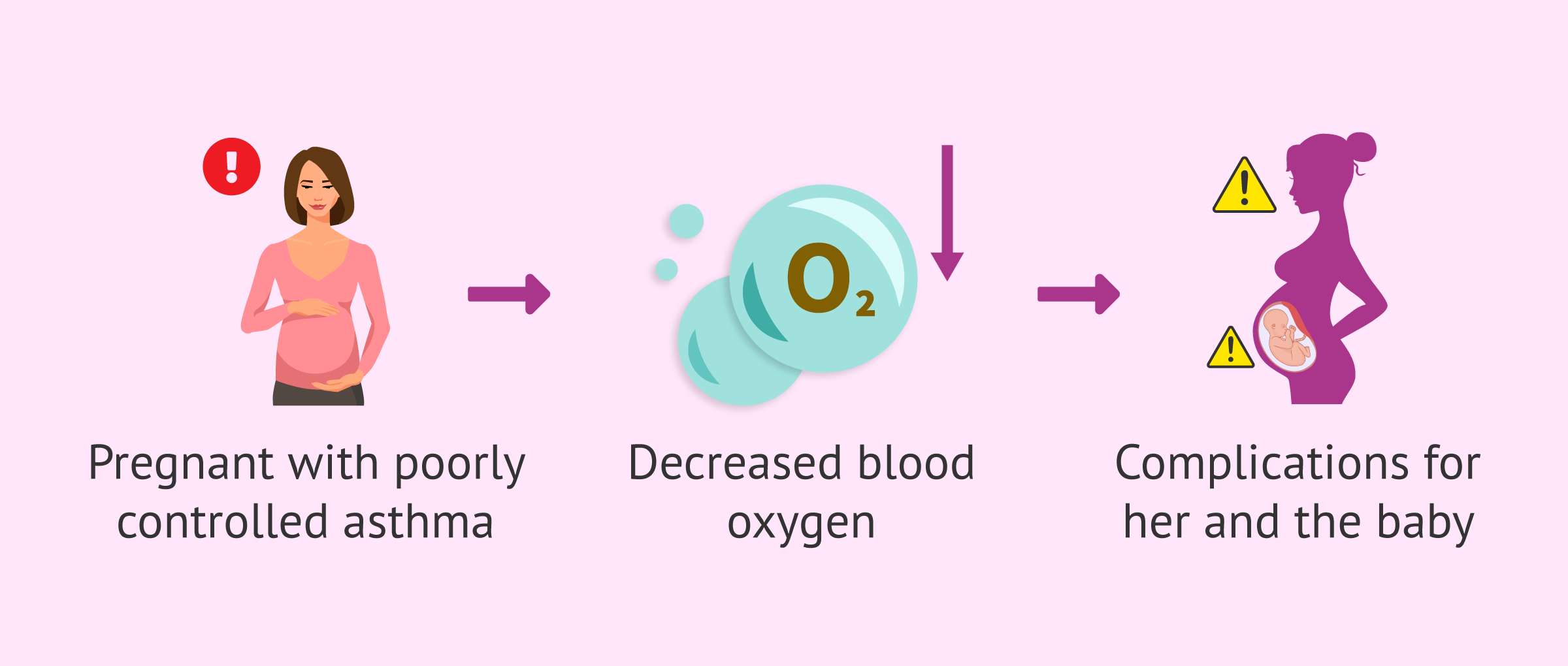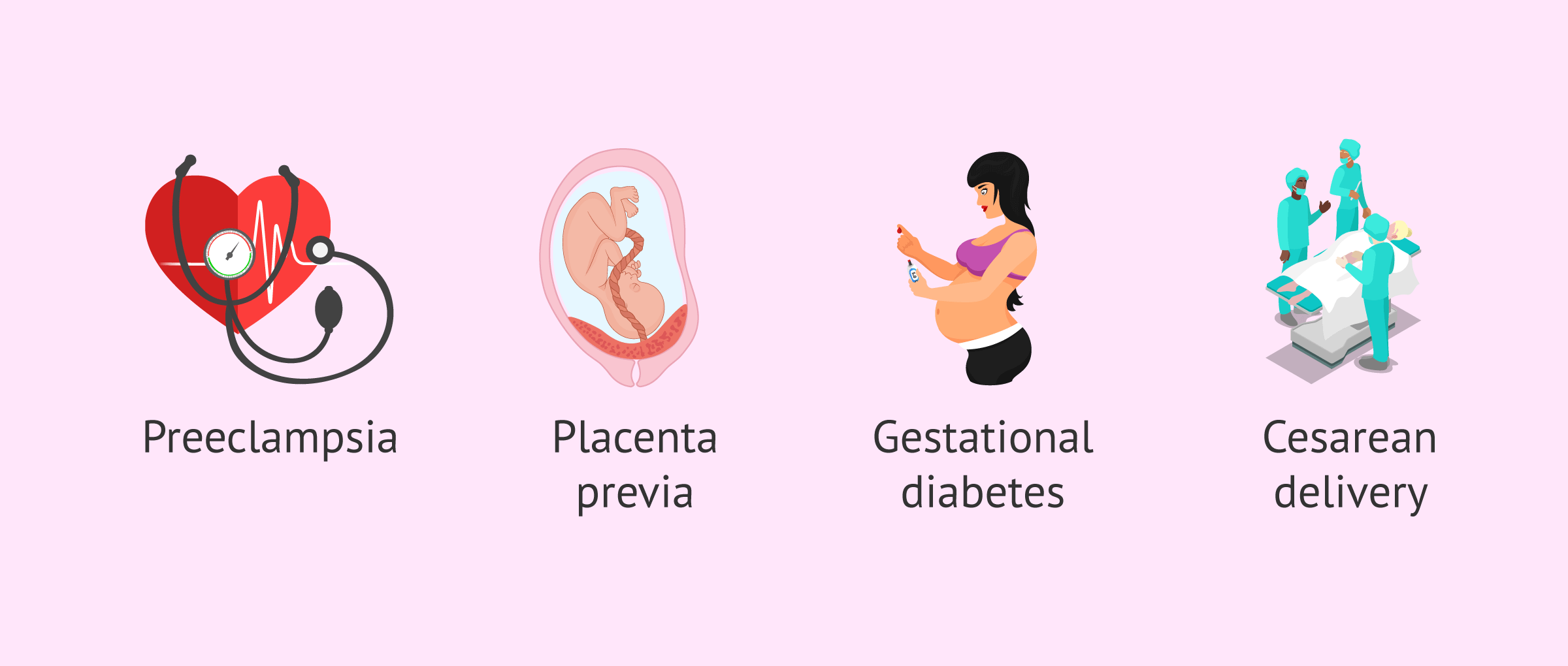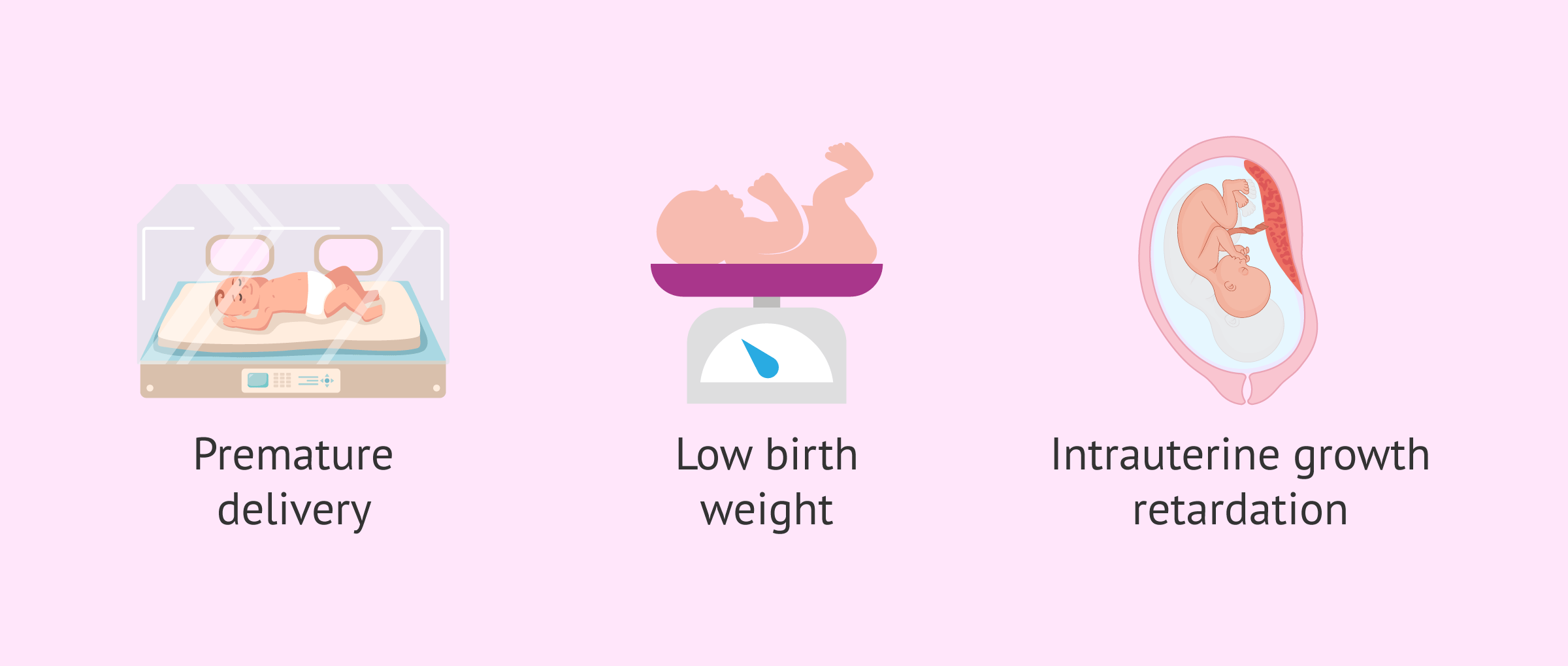Asthma is a chronic inflammatory disease affecting the airways (characterized by airway narrowing and reversible airflow obstruction following a triggering stimulus). The main symptoms are wheezing or whistling when breathing, shortness of breath and coughing.
During pregnancy, asthma may worsen in about one third of cases (especially if it is severe asthma); improve (in another third) or be unchanged (in the remaining third). In any case, adequate asthma control during pregnancy is important. Poor disease control can affect both the mother and her baby.
Provided below is an index with the 7 points we are going to expand on in this article.
- 1.
- 1.1.
- 1.2.
- 2.
- 3.
- 4.
- 4.1.
- 4.2.
- 5.
- 6.
- 7.
How can asthma affect pregnancy?
Poorly controlled asthma during pregnancy can have consequences for the mother (decreased blood oxygen), but it can also affect the baby (the amount of oxygen reaching the baby is reduced). However, if asthma is kept under control, the risk of complications is hardly increased.
Therefore, asthma in pregnancy should have a multidisciplinary approach adapted to each case. All specialists attending the asthmatic pregnant woman (obstetrician, pulmonologist, allergist, midwife, primary care physician...) should be aware of and participate in the correct management of the patient's asthma during pregnancy.
Complications for the pregnant woman with poorly controlled asthma
If the pregnant woman's asthma is not controlled, it increases the risk of some complications such as the following:
- Preeclampsia.
- Placenta previa.
- Gestational diabetes.
In addition, the risk of cesarean delivery is also increased.
Complications of poorly controlled asthma for the infant
Poor asthma control during pregnancy can have some complications for the baby. Among them we can mention:
- Premature delivery.
- Low birth weight.
- Intrauterine growth retardation.
- Perinatal mortality.
Therefore, adequate asthma control during the gestational period is essential to prevent possible exacerbations of the disease.
Asthma medication during pregnancy
It would be advisable for the woman to consult with her specialist if it is necessary to make any changes in her asthma medication during pregnancy, ideally even in a preconception consultation (before seeking pregnancy), in case the specialist considers it appropriate.
However, once the specialist has confirmed the treatment of asthma during pregnancy, it is very important to carry it out and comply with it. Likewise, all indicated check-ups should be attended to verify that everything is fine and that asthma is under control or to make any adjustments in the medication (it should be adjusted to the lowest doses that allow asthma to be controlled).
Sometimes, asthma worsens because the woman stops taking her treatment during pregnancy, for fear that it may affect the baby. However, poorly controlled asthma is considered to have more risks to mother and baby than the possible adverse effects of the usual asthma control medications.
While it is true that these drugs can cross the placental barrier, many of them do not affect the fetus (they have not been shown to present a risk in humans). Therefore, the benefits of these drugs (and thus keeping asthma under control) are considered to outweigh the potential risks.
Asthma control in pregnancy
Given the importance of keeping asthma under control during pregnancy to avoid certain maternal and fetal complications, it will be useful for the pregnant woman to pay attention to these recommendations:
- Attend all obstetric check-ups, but also asthma control check-ups with the pulmonologist and follow the indications and treatment prescribed by the specialists to keep asthma under control during pregnancy and avoid complications.
- Avoid known asthma triggers.
- Quitting smoking and avoiding tobacco smoke in the environment.
- Prevent respiratory infections. It is very interesting for the pregnant woman with asthma to ask about the flu vaccine to her specialist.
- Control weight gain in pregnancy. Obesity and excessive weight gain during the first trimester of gestation would be risk factors for the patient to suffer an exacerbation of the disease.
- Make sure with the specialist that the inhalers are used correctly.
- Know and pay attention to the symptoms that indicate that asthma is starting to get out of control, so that it can be detected and controlled as soon as possible. The specialist can help the woman recognize these signs.
If asthma is kept under control during pregnancy, complications that could arise from poor control of the disease during this period are avoided.
FAQs from users
What to do if I have an asthma attack during pregnancy?
Ideally, asthma in a pregnant woman should be managed in a multidisciplinary manner (obstetricians, pulmonologists, allergists...) and the woman should attend all specialist check-ups and follow the appropriate treatment to prevent asthma attacks or crises during pregnancy. However, if an asthma attack occurs during pregnancy, a specialist should be consulted as soon as possible.
The specialist will initially verify that it is an asthma attack (since sometimes during pregnancy a woman may experience some difficulty breathing for other reasons) and will then assess how severe the attack is. Depending on the severity, she will establish the appropriate treatment, which is usually similar to what an asthmatic woman who is not pregnant would receive, since control of the attack is essential (and the benefits of medication to control it outweigh the possible risks). Fetal monitoring will also be performed.
Can I use the asthma inhaler in pregnancy?
As a recommendation, the specialist should be consulted, even before becoming pregnant (when deciding to seek gestation), if any changes in asthma treatment during pregnancy would be necessary.
In general, inhaled corticosteroids are effective and important drugs for maintaining asthma control in pregnancy and preventing exacerbations, and are generally considered safe.
However, it is always the specialist who prescribes asthma treatment during pregnancy. In addition, follow-up visits should be scheduled to ensure that asthma remains under control.
Suggested for you
One of the possible complications for the pregnant woman with poorly controlled asthma is preeclampsia. If you want to know more about this pregnancy complication, you can access this link: What is preeclampsia in pregnancy? Why does it occur?
On the other hand, premature delivery can also occur as a consequence of poorly controlled asthma in pregnancy. You can read more about it in the following article: What causes preterm labor - Risks, causes and symptoms.
We make a great effort to provide you with the highest quality information.
🙏 Please share this article if you liked it. 💜💜 You help us continue!
References
Bonham CA, Patterson KC, Strek ME. Asthma Outcomes and Management During Pregnancy. Chest. 2018 Feb;153(2):515-527. doi: 10.1016/j.chest.2017.08.029. Epub 2017 Sep 1. PMID: 28867295; PMCID: PMC5815874.(View)
Bravo-Solarte DC, Garcia-Guaqueta DP, Chiarella SE. Asthma in pregnancy. Allergy Asthma Proc. 2023 Jan 1;44(1):24-34. doi: 10.2500/aap.2023.44.220077. PMID: 36719688; PMCID: PMC9809179. (View)
Lommatzsch M, Brusselle GG, Levy ML, Canonica GW, Pavord ID, Schatz M, Virchow JC. A2BCD: a concise guide for asthma management. Lancet Respir Med. 2023 Jun;11(6):573-576. doi: 10.1016/S2213-2600(22)00490-8. Epub 2023 Jan 27. PMID: 36716752. (View)
Namazy JA, Schatz M. Contemporary management and treatment strategies for asthma during pregnancy. Expert Rev Respir Med. 2021 Sep;15(9):1149-1157. doi: 10.1080/17476348.2021.1935243. Epub 2021 Jul 8. PMID: 34058955. (View)
Namazy JA, Schatz M. Management of Asthma during Pregnancy: Optimizing Outcomes and Minimizing Risk. Semin Respir Crit Care Med. 2018 Feb;39(1):29-35. doi: 10.1055/s-0037-1606216. Epub 2018 Feb 10. PMID: 29427983. (View)
Vyawahare AP, Gaidhane A, Wandile B. Asthma in Pregnancy: A Critical Review of Impact, Management, and Outcomes. Cureus. 2023 Dec 7;15(12):e50094. doi: 10.7759/cureus.50094. PMID: 38186538; PMCID: PMC10770773. (View)
Wang H, Li N, Huang H. Asthma in Pregnancy: Pathophysiology, Diagnosis, Whole-Course Management, and Medication Safety. Can Respir J. 2020 Feb 22;2020:9046842. doi: 10.1155/2020/9046842. PMID: 32184907; PMCID: PMC7060439. (View)
FAQs from users: 'What to do if I have an asthma attack during pregnancy?' and 'Can I use the asthma inhaler in pregnancy?'.




